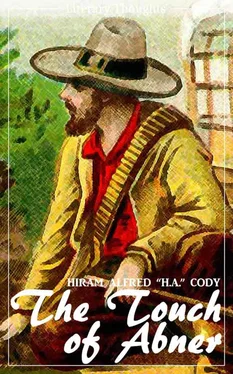"But, Tildy, I thought I was really old man Astor, an' saw millions of dollars right before me."
"Well, if that's the way you felt, I think it's about time we called in the doctor. There's surely something wrong with your head."
"But, Tildy, ye don't understand. De ye think I was goin' to set there an' let them people git off with their cussed meanness? Not by a jugful! Gid-dap, Jerry, what's the matter with ye?"
"But what about that thousand dollars? Do you expect to pay it?"
"Sure I do."
"Where's it to come from, then?"
"Oh, I'll find it somewheres."
"Not out of that old farm of ours, let me tell you that. Why, it's nothing but a heap of gravel, and you know as well as I do how hard we scratch and dig to raise anything. But you would buy the place, no matter what I said."
"It's a mighty fine situation, though, Tildy. G'long, Jerry."
"It may be that, Abner, but you can't live on a fine situation these days. Haven't you always had fine situations for over twenty years now, and what have they amounted to?"
"Yes, I've touched on a good many things in that time, Tildy. I ran the old 'Flyin' Scud' on the river fer five years; an' then I bought that thrashin' machine from Sol Britt, an' ran it fer awhile. After that I went in fer lumberin', an' kept it up fer several winters. Now I'm into farmin'. Yes, ye'r quite right about the situations. I've had several fine ones, sure enough."
"And made a mess of them all, Abner. Everything you touched failed. And I expect it will be the same with the farm."
"Oh, I don't know about that, Tildy. We manage to git along an' make a comfortable livin'. I've allus depended upon three things to pull me through."
"You have? What are they? I never heard of them."
"Brains, gall, an' luck. They've never failed me yit, an' I guess they won't now."
"H'm," and Mrs. Andrews tossed her head in disgust. "I know you've got plenty of gall, but as for brains and luck, well, I have my serious doubts."
"Yes, I guess ye'r right, Tildy. I reckon I had a lot of gall when I asked ye to marry me. But as fer brains an' luck, well I don't know. Gid-dap, Jerry."
To these words Mrs. Andrews made no reply. Silence reigned for a few minutes, save for the rattle of the carriage and the beat of the horse's feet upon the road. Abner grew restless. He shifted uneasily in his seat, and coughed. Then he began to whistle, a sure sign of the agitated state of his mind. The whistle soon gave place to the humming of the only piece he knew:
"When Bill Larkins made his money,
Piled it up in heaps galore,
Dam old fool he wasn't happy,
'Cause he always wanted more."
Even this didn't have the desired effect. He could stand anything from his wife but dead silence. That alone affected him.
"Say, Tildy," he at length ventured.
"Well, what is it? I should think you'd be ashamed to speak to me after such insulting words."
"But, Tildy."
"Yes, I hear you. What is it?"
"Didn't Ikey Dimock squirm when I landed on him? Ho, ho!"
"And I squirmed, too, Abner. I never felt so ashamed of anything in all my life."
"But ye didn't squirm like Ikey, though, Tildy. My, it tickled me all to pieces to give him that jolt. Why, I knew Ikey when he used to pick pin-feathers off his mother's chickens when she was gittin' 'em ready fer market. He wasn' sich a bad critter then. But since he got hitched to that high-flyer, an' set up in the hardware bizness, ye can't touch him with a ten-foot pole. But I made him squirm. Ho, ho! G'long, Jerry."
"Maybe you'll squirm, Abner, when they come for that money. Then it won't be such fun. I wonder what Jess'll say. She's coming home to-morrow, remember."
"Jess! Skiddy-me-shins! I fergot all about her!"
"You certainly did. And you must have forgotten that it took every cent we could make and scrape together to put her through the Seminary. What will she say and think when she finds out what you have done?"
"Don't let's tell her, Tildy. She needn't know anythin' about it."
"H'm, that's easier said than done. You'll be the first one to tell her, Abner, when you meet her in the morning at the station."
"No, I won't, Tildy. Jess'll not hear it from me, blamed if she will. G'long, Jerry."
Abner was early at the station the next morning, and after he had hitched his horse to a post near the building, he strolled into the waiting-room. Seeing the station agent busily reading The Live Wire he stepped toward the ticket-window and peered through.
"'Mornin', Sam," he accosted. "How's the train?"
"Fifteen minutes late," the agent replied as he lowered his paper. "You're early, Mr. Andrews. You'll have to wait nearly an hour."
"Oh, I don't mind that, Sam," and Abner reached down into his pocket as he spoke and brought forth a pipe, tobacco, and knife. "I allus make a bizness of bein' ahead of time. I s'pose ye often see people runnin' to catch the train, eh?"
"Indeed I do, and they generally make a lot of trouble for themselves and everybody else."
"That's jist it. I've often told Tildy that if people'd use their brains more an' their legs less it'd be a darn sight better fer all consarned. What's the news, Sam?"
"Why, haven't you seen the paper this morning, Mr. Andrews?" the agent asked in surprise.
"Naw, I don't go much on dailies; they've too many 'vertisement. I take the Family Herald and git a hull library every week fer one dollar a year. Ye kin find most everythin' ye want in the Herald from raisin' hogs to teethin' babies. It's sartinly great."
"But The Live Wire should interest you this morning, Mr. Andrews. It has a long article on the meeting last night, and about your generous gift toward the Orphan Home."
"Ye don't tell! Well, I guess I know as much about last night's meetin' as the feller who was there waggin' the pen. That's the trouble with The Live Wire; it tells ye things ye already know."
Although Abner pretended to be completely indifferent about the account of the meeting, in reality he was most anxious to read what the paper had to say about it. But after what he had said about the dailies, it would not do for him to back down now. The agent would have a laugh at his expense. He could buy a copy at the drug-store up the street.
"Keep an eye on my hoss, will ye, Sam? I've got to git some corn-salve fer Tildy. She fergot it yesterday, an' her corns were mighty bad last night."
"Is your horse afraid of trains, Mr. Andrews?"
"Afraid of trains! Well, I guess ye don't know Jerry. Why, that hoss likes a noise better'n he does his oats."
"That's curious, isn't it?"
"S'pose 'tis. But ye see, Jerry was raised in a pasture near the railroad, an' then he lived in town fer a few years. After I bought him an' took him to Ash Pint, it was so quiet there he began to pine an' pine, an' wouldn't eat nor drink. Thinkin' he was goin' to die, I brought him to town to see the hoss doctor. But, skiddy-me-shins, if he didn't buck right up as soon as he heard the whistle of the train. He was like a new hoss."
"Has he got over the quietness of the country yet?" the agent enquired.
"Not altogether. He kin stand it fer a few days, an' then when I see he's longin' fer the trains, I tak' the big tin horn and blow it close to his ears fer all I'm worth. That cheers him up a bit; but there's nothin' like the yell of one of them big en-gines to give him solid comfort. Jerry is sartinly a knowin' hoss."
Abner left the waiting-room and sauntered along the street in the direction of the drug-store. He knew all the business men in Glucom, and they always spoke or nodded to him in passing. But this morning the ones he met seemed unusually friendly, and stopped to shake hands, and enquire after his health. It was Lawyer Rackshaw, however, who was the most effusive. He met Abner just in front of the drug-store, and accosted him as a long-lost friend.
Читать дальше












